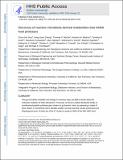Discovery of Reactive Microbiota-Derived Metabolites that Inhibit Host Proteases
Author(s)
Guo, Chun-Jun; Chang, Fang-Yuan; Wyche, Thomas P.; Backus, Keriann M.; Acker, Timothy M.; Funabashi, Masanori; Taketani, Mao; Donia, Mohamed S.; Nayfach, Stephen; Pollard, Katherine S.; Craik, Charles S.; Cravatt, Benjamin F.; Clardy, Jon; Voigt, Christopher A.; Fischbach, Michael A.; ... Show more Show less
Downloadnihms838322.pdf (1.604Mb)
PUBLISHER_CC
Publisher with Creative Commons License
Creative Commons Attribution
Terms of use
Metadata
Show full item recordAbstract
The gut microbiota modulate host biology in numerous ways, but little is known about the molecular mediators of these interactions. Previously, we found a widely distributed family of nonribosomal peptide synthetase gene clusters in gut bacteria. Here, by expressing a subset of these clusters in Escherichia coli or Bacillus subtilis, we show that they encode pyrazinones and dihydropyrazinones. At least one of the 47 clusters is present in 88% of the National Institutes of Health Human Microbiome Project (NIH HMP) stool samples, and they are transcribed under conditions of host colonization. We present evidence that the active form of these molecules is the initially released peptide aldehyde, which bears potent protease inhibitory activity and selectively targets a subset of cathepsins in human cell proteomes. Our findings show that an approach combining bioinformatics, synthetic biology, and heterologous gene cluster expression can rapidly expand our knowledge of the metabolic potential of the microbiota while avoiding the challenges of cultivating fastidious commensals. Keywords: microbiome; natural products; synthetic biology; metagenomics; biosynthetic gene cluster; peptide aldehyde; protease inhibitor
Date issued
2017-01Department
Massachusetts Institute of Technology. Department of Biological Engineering; Massachusetts Institute of Technology. Synthetic Biology CenterJournal
Cell
Publisher
Elsevier BV
Citation
Guo, Chun-Jun et al. “Discovery of Reactive Microbiota-Derived Metabolites That Inhibit Host Proteases.” Cell 168, 3 (January 2017): 517–526 © 2017 Elsevier Inc
Version: Author's final manuscript
ISSN
0092-8674
1097-4172